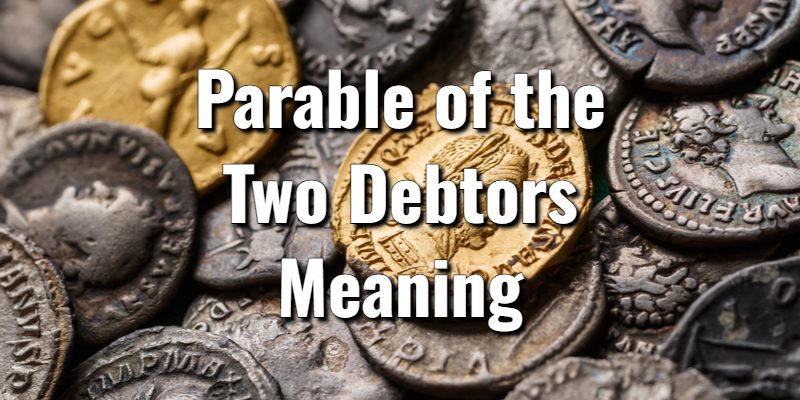In this parable, Jesus is responding to a thought (Editor’s note: yes, you read that correctly!) by His dinner host which sparks this teaching. Christ attempts to teach Simon to see a sinner woman as He does. This parable is also an opportunity for Jesus to show Simon and the reader that the woman in this story loves Him more because she has been forgiven of greater sins. The fact that Christ responded to Simon’s unspoken thought shows him God-like abilities. The Bible then goes on to make a clear comparison between this situation and a story centered around two debtors, both owing different amounts, but both being unable to pay. Jesus then asks Simon which of the debtors will love the moneylender more. Simon answers that it would be the one who had the larger debt forgiven. It teaches that those who recognize the depth of their sinfulness and experience the forgiveness of God’s grace respond with gratitude. Ultimately, the parable underscores the importance of recognizing our need for forgiveness and responding with faith, gratitude, and obedience to the one who offers it, Jesus Christ.
Parable of the Two Debtors Meaning
The Parable of the Two Debtors meaning can be found in Luke 7:36-50:
Luke 7:36-50
“And one of the Pharisees desired him that he would eat with him. And he went into the Pharisee’s house, and sat down to meat. And, behold, a woman in the city, which was a sinner, when she knew that Jesus sat at meat in the Pharisee’s house, brought an alabaster box of ointment, And stood at his feet behind him weeping, and began to wash his feet with tears, and did wipe them with the hairs of her head, and kissed his feet, and anointed them with the ointment. Now when the Pharisee which had bidden him saw it, he spake within himself, saying, This man, if he were a prophet, would have known who and what manner of woman this is that toucheth him: for she is a sinner. And Jesus answering said unto him, Simon, I have somewhat to say unto thee. And he saith, Master, say on. There was a certain creditor which had two debtors: the one owed five hundred pence, and the other fifty. And when they had nothing to pay, he frankly forgave them both. Tell me therefore, which of them will love him most? Simon answered and said, I suppose that he, to whom he forgave most. And he said unto him, Thou hast rightly judged. And he turned to the woman, and said unto Simon, Seest thou this woman? I entered into thine house, thou gavest me no water for my feet: but she hath washed my feet with tears, and wiped them with the hairs of her head. Thou gavest me no kiss: but this woman since the time I came in hath not ceased to kiss my feet. My head with oil thou didst not anoint: but this woman hath anointed my feet with ointment. Wherefore I say unto thee, Her sins, which are many, are forgiven; for she loved much: but to whom little is forgiven, the same loveth little. And he said unto her, Thy sins are forgiven. And they that sat at meat with him began to say within themselves, Who is this that forgiveth sins also? And he said to the woman, Thy faith hath saved thee; go in peace.”
Lord's Library participates in affiliate programs. We may make a small commission from products purchased through this resource.
- The 6 Best 1 Corinthians Commentaries to Read in 2025 - March 24, 2025
- The 8 Best 1 Corinthians Bible Study Books to Read in 2025 - March 24, 2025
- 2 Timothy 1:9-10 Meaning: Commentary on Important Scriptures - March 22, 2025













